- Our Products
- Upper Extremity
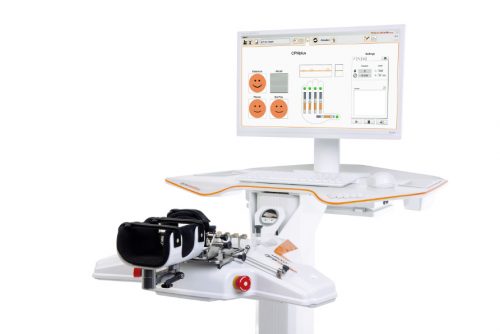 Amadeo Finger-Hand-Rehabilitation
Amadeo Finger-Hand-Rehabilitation
Amadeo is giving hands back their grip and fingers their finesse. Patients who are barely able or unable to grasp can perform hundreds of robot-assisted grasping movements. It won’t train a new Mozart. But it will help patients return to the piano, handwriting Christmas cards, and grabbing life firmly by the horns.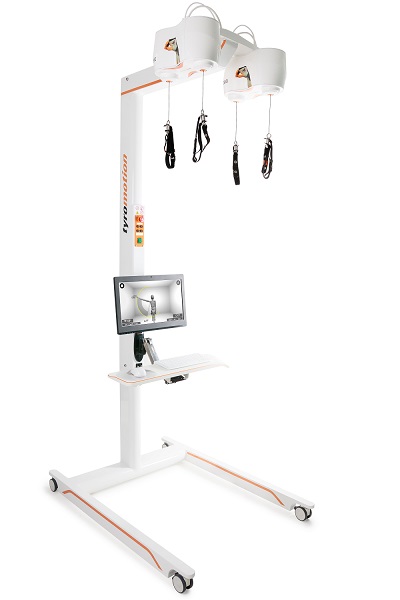 DiegoShoulder-Arm-Rehabiliation
DiegoShoulder-Arm-Rehabiliation
Diego is designed to strengthen what’s important. Whether proximal or distal training, Diego purposefully supports the rehabilitation of natural motion, allows the handling of everyday objects to be relearned, and is usable by adults and children alike. Myro Interactive and task-specific therapy
Myro Interactive and task-specific therapy
Myro is made for making humans get better! The sensor-based surface enables task-oriented rehabilitation with real objects, trains the patient’s cognitive abilities, and improves motor abilities of the upper extremity. Pablo Upper Extremity Rehabilitation
Pablo Upper Extremity Rehabilitation
As a multifunctional rehabilitation device with comprehensive accessories, Pablo enhances classical therapy exercises with biofeedback, objective assessments, and gamification. It won´t train the next Picasso. But it will help patients to take back control of their lives. Tyrostation The perfect therapy setting
Tyrostation The perfect therapy setting
The Tyrostation is home to all components of Pablo and Tymo and provides ergonomic adaptability for patients. Sometimes, it´s about the little things in life – or therapy.
- Lower Extremity
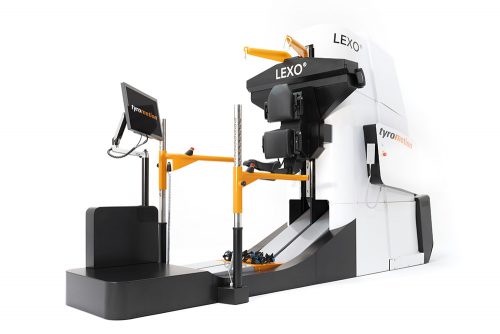 LexoGait and Locomotion
LexoGait and Locomotion
Lexo is a revolutionary gait trainer and impresses with fast setup, high patient activity and optimal trunk support. It encourages active participation and enables therapists to focus fully on their patients.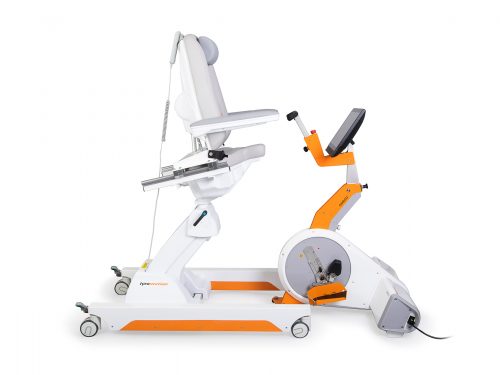 Omego Plus Gait training for the goals across all phases
Omego Plus Gait training for the goals across all phases
More than just a therapy bike! Omego Plus combines uni- and bilateral leg training, leg press, stepper, cycling & foot lift training in one device. Stride stronger with Omego Plus! Tymo Balance training and postural control
Tymo Balance training and postural control
Small but powerful! Tymo is a versatile measurement and therapy system for the whole body. In addition to the standing position, Tymo offers a wide range of options for maximum variety during therapy.
- MTT-Line
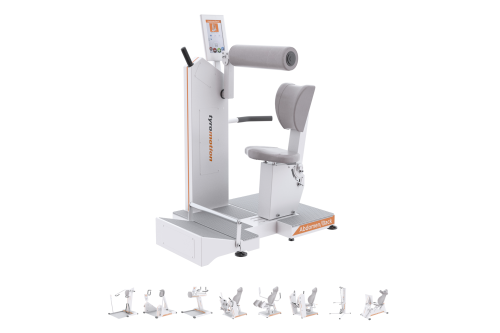 MTT-LineMedical training therapy
MTT-LineMedical training therapy
Get back in the game with the MTT-Line! The Medical Training Therapy devices are specifically designed to strengthen the six major muscle groups of the human body. Barrier free and maximum adjustability make the devices accessible for all types of patients.
- Software
 Maya Therapy Platform
Maya Therapy Platform
Maya reduces paperwork, standardizes documentation, and automates reporting, making administration effortless and efficient. Designed for therapists to work wonders!
- Upper Extremity
Health
Aphasia – Lost for words
6. June 2022 ● 4 min. Reading time

Types of aphasia
Broca aphasia (expressive aphasia):
Broca aphasia mainly affects the ability to produce speech. Aphasia patients often speak very slowly, seem to take a long time to order their thoughts, or seem unable to find the right words. Any communication takes place in “telegraphic speech”: Affected patients speak in sentences containing only one or two words, often with grammatical errors. Also articulation of words (dysarthria) reading and writing are affected.
Speech comprehension is often not or only partially affected.
Many of those who are affected are impatient with the inability to express themselves or with the long-time communication needs. This can reduce verbal communication even more.
Wernicke aphasia (sensory aphasia):
Patients with Wernicke aphasia often talk a lot and use words incorrectly. They do not realize that their speech lacks coherence and meaning.
Patients also struggle to understand others, to read, and to write. Sometimes, this means verbal communication is impossible. Non-verbal communication is possible to a certain extent.
Affected patients often respond to their surroundings with severe incomprehension. They cannot understand why the person they are talking to cannot understand them.
Amnesic aphasia:
Amnesic aphasia mainly affects the ability to find the rights words. Speech comprehension, reading, and writing are usually only moderately affected. Communication with the patient is reasonably easy.
Global aphasia:
Severe strokes affecting the middle cerebral artery (Arteria Cerebri Media) can cause both expressive and sensory aphasia, resulting in a complete loss of both the ability to speak and to understand speech. Affected patients use many automatisms, repeat phrases over and over, or speak little to not at all. Reading, writing, and body language are also affected.
This makes communicating with stroke survivors affected by global aphasia extremely difficult and requires patience and empathy from those involved.
Diagnosis of Aphasia
Speech disorders often occur in connection with a stroke. If there is no obvious cause for a speech disorder, it is necessary to exclude other possible reasons (deafness, etc.).
Parameters for diagnosing speech disorders
- Spontaneous speech: How many words are used? How fluent is the speech? Does the patient hesitate?
- Repetition: Is the patient able to repeat complex grammatical structures?
- Comprehension: Does the patient identify the named objects? Are they able to follow simple or complex instructions? Is the patient able to answer simple or complex yes-or-no questions?
- Naming objects: Patients often paraphrase (using phrases such as “the thing you use to tell the time” instead of “clock”).
- Reading and writing: The abilities to understand written words, to spell correctly, and to write from dictation are assessed.
Standardized aphasia tests are carried out to diagnose aphasia.
Prognosis and treatment for aphasia following a stroke
The prognosis depends on the degree of cerebral damage and on the severity of the disorder. Other important factors are general health, co-existing symptoms, and motivation.
It is possible that aphasic symptoms disappear by themselves within the first six months of a stroke. Speech therapy supports the reduction of speech disorders and improves the expression and comprehension of speech.
The sooner the patient starts therapy and the more regular the sessions, the better the prognosis. Goal of the therapy is to reactivate verbal communication.
Interacting with people suffering from aphasia
Aphasia, such as triggered by a stroke, does not primarily affect mental abilities. It is a speech disorder, not a mental disability. The difference is key when interacting with patients affected by communication problems.

How to better communicate with aphasia patients
SPEAKING
- Create a calm environment.
- Speak calmly, not too fast, but normally and at a normal volume.
- Use short sentences. Small pauses between sentences can help the other person to understand you better.
- Use more non-verbal signals. In addition to tone, facial expressions, and body language, writing and images can help affected patients follow to the conversation.
- If the other person does not immediately understand you, try rewording.
- Where possible, use yes-no questions instead of open questions.
- Have one-on-one conversations, as patients with aphasia find personal conversations easier than group discussions.
UNDERSTANDING
- Listening means waiting: The patient needs more time to say something.
- Listen with your heart: Try to understand what the patient is trying to tell you.
- Listen beyond the language: Do not interrupt or correct all the time. Just wait, the meaning often becomes clear.
- Let the situation speak: Thinking ahead and carefully observing the situation will help you to understand.
- Try and decipher the meaning of a statement together with the patient. Be aware of non-verbal communication.
- In the case of perseverating repetitions interrupt and distract.
- Don’t give up! Use the key phrase: “We’ll figure it out together – start again!”
- Hyperfocusing does not work! If needed, use the key phrase: “Maybe you can tell me later.”
Author: Saskia Wibner
Quellen:
Lutz, L. (2011). Das Schweigen verstehen, Über Aphasie. Springer-Verlag Berlin Heidelberg
Efficacy of Intensive Aphasia Therapy in Patients with Chronic Stroke: A Randomised Controlled Trial, 2018
Aphasia Recovery: When, How and Who to Treat?, 2018
Screening tests for aphasia in patients with stroke: a systematic review, 2017
You might also be interested in
4. April 2023
Health
Rehabilitation
Stroke nutrition guidelines for optimal health
Nutrition as the key part in health and well-being of stroke survivors A healthy, balanced …
21. March 2023
Rehabilitation
Kinesio taping in neurology as a useful therapy supplement
The Kinesio tape and its usefulness in neurological therapy What was originally known only from …
7. March 2023
Rehabilitation
Exercises against freezing of gait in Parkinson’s disease
When the legs freeze – how does the symptom “Freezing of Gait” manifest itself? Parkinson’s …



 Contact
Contact 

 Contact
Contact 

